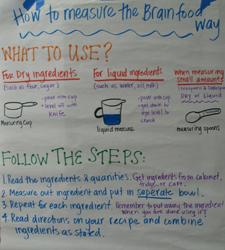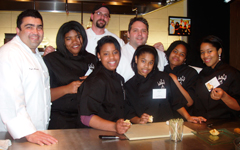Curriculum
 The Brainfood Approach
The Brainfood Approach
Brainfood is a non-profit youth development organization in Washington, DC. Using food as a tool, Brainfood builds life skills and promotes healthy living in a fun and safe environment.
Our programs engage local high school students in hands-on cooking classes, lectures, field trips and community service projects. Brainfood graduates are equipped with practical cooking skills, an introduction to the food industry, a framework for nutritious eating, and leadership experience that prepares them to make a difference in their community.
Youth Development at Brainfood
At Brainfood, we provide youth with a safe and structured environment where they are encouraged to take healthy risks, challenge themselves, learn new skills, and make healthy choices. Brainfood programs are designed to address the capacities, strengths, and development needs of youth.
What is Youth Development?
- Youth development is an approach to working with young people that defines outcomes based on capacities, strengths, and development needs of youth. (AED Advancing Youth Development Curriculum)
- Youth Development is the process which prepares young people to meet the challenges of adolescence and adulthood through a coordinated, progressive series of activities and experiences which help them to become socially, morally, emotionally, physically, and cognitively competent. Positive youth development addresses the broader developmental needs of youth, in contrast to deficit-based models which focus solely on youth problems. (National Youth Development Information Center)
- Youth development is not a highly sophisticated and complicated prescription for "fixing those troubled kids." Youth development is about people, programs, institutions and systems who provide all youth—"troubled" or not—with the supports and opportunities they need to empower themselves. (Center for Youth Development and Policy Research)
Program Outcomes
Brainfood’s program outcomes are based on the Search Institute’s 40 Developmental Assets®
- Responsibility & Autonomy (Accountability) - A perception that one has some control over daily events and is accountable for one’s own actions and for the consequences on others.
- Civic and Social Ability - The ability and motivation to work collaboratively with others and for the larger good and to sustain caring friendships and relationships with others.
- Productive Member of Society - The ability and motivation to gain functional and organizational skills necessary for employment – including the steps necessary for reach goals – and the ability and motivation to learn in school and other settings. To use critical thinking, to be creative, and to use problem-solving and expressive skills.
- Mastery and Future - A perception that one is “making it” and will succeed in the future.
Curriculum Structure
Brainfood programs are based on activities with specific functions to enhance the youth development process. Each session is structured as follows:
- Check-in/Opening: Participants, staff and volunteers choose a Group Expectation that they want to focus on for the day.
- Activity or discussion: New vocabulary word or cooking skill, discussion about food justice or sustainability, scavenger hunt, taste test, or food identification.
- Time to prep, cook, and clean: Working in groups, participants find ingredients and kitchen equipment, prepare ingredients, read and follow their recipe and then clean their dishes and work stations.
- Let's eat: As a way to build community and enjoy our food, we gather together to sample all the food and discuss what we liked (or didn’t like) about each of the recipes.
- Closing & Appreciations: Each session finishes with a closing activity where participants each share something they learned that day or someone they appreciated and why.

.190x190.JPG)
.190x190.JPG)

.190x190.JPG)

